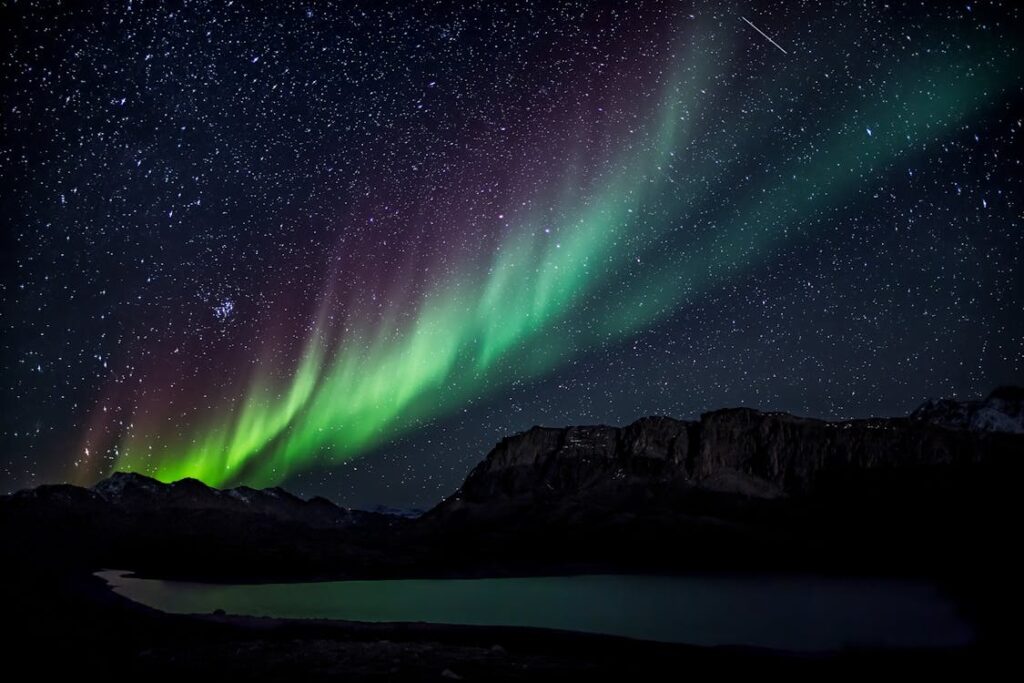The Northern Lights or Aurora Borealis have long captivated observers with their mesmerizing displays of colour and light. Traditionally associated with polar regions, these natural phenomena have become increasingly visible across the UK in 2024, offering residents and visitors a rare opportunity to witness this celestial spectacle.
Understanding the Northern Lights
The Northern Lights occur when charged particles from the sun collide with gases in Earth’s atmosphere, resulting in vibrant displays of light. These interactions typically produce green, pink, and purple hues that dance across the night sky. While commonly observed in high-latitude regions like Norway and Canada, recent solar activity has expanded their visibility to more temperate areas, including the UK.
Increased Visibility in 2024
In 2024, the UK has experienced more frequent sightings of the Northern Lights due to heightened solar activity. The sun is approaching its “solar maximum,” the peak of its 11-year cycle, characterized by increased sunspot activity and solar flares. These events enhance the likelihood of geomagnetic storms, which, in turn, make the aurora more visible at lower latitudes. The Met Office has noted that this phase could last up to a year, providing ongoing opportunities for aurora sightings across the UK.
Optimal Viewing Locations in the UK
While the Northern Lights can occasionally be seen throughout the UK, certain locations offer better viewing conditions:
Scotland: Northern regions, particularly the Shetland Islands, Orkney, and the Highlands, provide some of the best vantage points due to their higher latitudes and lower light pollution.
Northern England: Areas such as Northumberland and the Lake District have reported sightings, especially during strong geomagnetic activity.
Wales: The Brecon Beacons, designated as an International Dark Sky Reserve, offer excellent conditions for stargazing and potential aurora viewing.
Northern Ireland: The Antrim coast, including spots like the Giant’s Causeway, has occasionally witnessed the aurora.
Tips for Aurora Watching
To maximize your chances of witnessing the Northern Lights:
Check Aurora Forecasts: Services like AuroraWatch UK provide real-time alerts and forecasts for aurora activity.
Seek Dark Skies: Find locations away from urban light pollution. Dark Sky Parks and Reserves are ideal.
Monitor Weather Conditions: Clear, cloudless nights are essential for visibility.
Be Patient: Aurora activity can be unpredictable. Spending several hours outdoors increases your chances of a sighting.
Capturing the Aurora
Photographing the Northern Lights requires some preparation:
Use a Tripod: Stability is crucial for long-exposure shots.
Adjust Camera Settings: Set a high ISO, wide aperture, and long exposure time to capture the faint lights.
Manual Focus: Focus on a distant light or the moon to ensure sharp images.
Dress Warmly: Nights can be cold; appropriate clothing will keep you comfortable during extended periods outdoors.
Looking Ahead
As the sun continues its journey through the solar maximum, the UK may experience more frequent and intense displays of the Northern Lights. This period offers a unique opportunity for residents and visitors to witness one of nature’s most captivating phenomena without traveling to polar regions.
